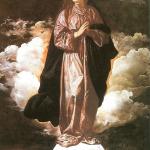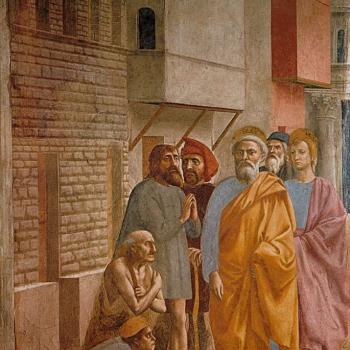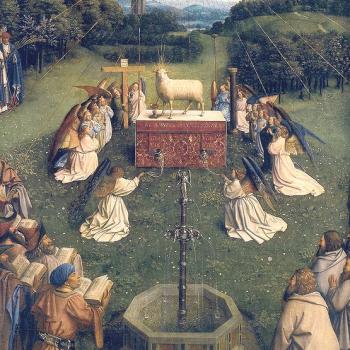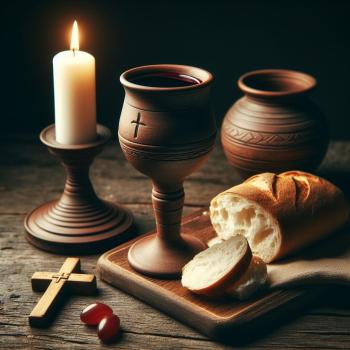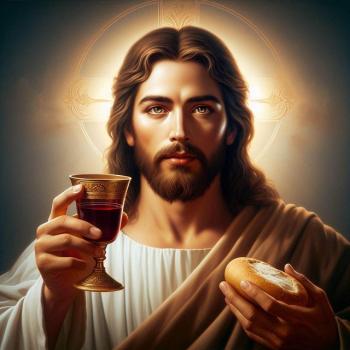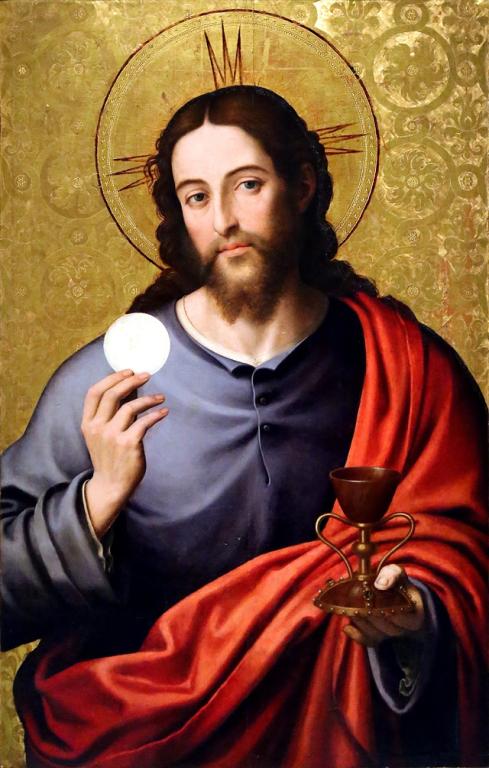
(2-4-05; abridged and very slightly edited / added to otherwise, on 12-7-17)
***
This is drawn from what was originally a very extensive dialogue with a friendly and learned Reformed Protestant, Alastair Roberts. At first, he himself asked me to respond to a series that he wrote on the topic. I was happy to oblige. I feel, however, that the two-part dialogue (see parts one / two, via Internet Archive) is far too long and involved for the vast majority of readers to be willing to follow. For the few who are willing and interested, I have provided the old links. Here, I have retained what I feel is the heart and substance of my comments, stimulated by a worthy and ecumenical dialogical opponent. That is still quite long enough, as it is!
***
Catholics don’t have to make the dichotomous choice of believing that the Eucharist is real, but not also a sign or symbol as well, just as St. Augustine held. I’ve written about this false dichotomy in my paper, “St. Augustine’s Belief in the Real Presence” [see the later revised version].
What we need to appreciate is that reality dwells in the realm of symbols and symbols dwell in the realm of reality. Symbols and reality depend upon each other for existence.
I agree. In my paper just-mentioned, I wrote:
I claimed [as a Protestant] that St. Augustine . . . adopted a symbolic view of the Eucharist. I based this on his oft-stated notion of the sacrament as symbol or sign. I failed to realize, however, that I was arbitrarily creating a false, logically unnecessary dichotomy between the sign and the reality of the Eucharist, for St. Augustine — when all his remarks on the subject are taken into account — clearly accepted the Real Presence. The Eucharist — for Augustine, and objectively speaking — is both sign and reality. There simply is no contradiction.
A cursory glance at Scripture confirms this general principle. For instance, Jesus refers to the sign of Jonah, comparing the prophet Jonah’s three days and nights in the belly of the fish to His own burial in the earth (Mt 12:38-40). In this case, both events, although described as signs, were quite real indeed. Jesus also uses the terminology of sign in connection with His Second Coming (Mt 24:30-31), which is believed by all Christians to be a literal event, and not symbolic only.
. . . St. Augustine’s symbolic language can be synthesized with his “realistic” language, because realism can co-exist with symbol while retaining its realism . . . symbolic language can also (and indeed often does in Augustine) refer to other, more communal aspects of the Eucharist which complement (but are not contrary to) the “Real Presence” aspect of it.
. . . The simple fact of the matter is that Augustine speaks in both ways. But we can harmonize them as complementary, not contradictory, because Catholics, like Augustine himself, tend to think in terms of “both/and” rather than the dichotomous “either/or” prevalent in Protestantism. Thus, when some Augustinian symbolic Eucharistic utterance is found, it is seized upon as “proof” that he thereby denied the Real Presence.
This is neither logically compelling, nor scholarly, since there are many of his statements which clearly indicate that he held to the literal, Real physical Presence of Christ in the Eucharist, and the Sacrifice of the Mass, and the priesthood, which makes no sense.
The whole idea of sacramentology can be summed up as: “matter can convey grace.” That can in turn be paraphrased as “nature (including sensory data) can and does convey grace.” Put that way, obviously a nature vs. grace dichotomy is precluded. It would seem that the Incarnation would have put that false dichotomy to rest in the first place (which is why we see the Eucharist as an “extension” of the Incarnation).
If matter can convey grace, then it (in the sacrament) is being used as a channel or medium for that purpose. Scripture indicates that grace (in one definition of it, anyway) is a thing which can be “distributed,” if you will, by God. Thus, linguist W. E. Vine wrote:
. . . in another objective sense, the effect of grace, the spiritual state of those who have experienced its exercise, whether (1) a state of grace, e.g., Rom. 5:2; 1 Pet. 5:12; 2 Pet. 3:18, or (2) a proof thereof in practical effects, deeds of grace, e.g., 1 Cor. 16:3 . . .; 2 Cor. 8:6,19 . . . the power and equipment for ministry, e.g., Rom. 1:5; 12:6; 15:15; 1 Cor. 3:10; Gal. 2:9; Eph. 3:2,7 . . .
(An Expository Dictionary of New Testament Words, Old Tappan, New Jersey: Fleming H. Revell Co., 1940, vol. 2, 170, “Grace” / “Charis”)
Many biblical instances of sacramental occurrences had nothing to do with the divinely instituted symbology of the Last Supper / Eucharist, but illustrate and confirm this understanding of matter conveying grace: Elisha’s bones causing a man to be raised from the dead (2 Ki 13:20-21), Paul’s handkerchief (Acts 19:11-12) and Peter’s shadow (Acts 5:15-16) healing people, and Elijah’s mantle causing the Jordan River to part (2 Ki 2:11-14). These also constitute excellent, explicit biblical evidence for relics. Very un-Protestant, yet very biblical . . .
The old Protestant objection is that the Mass is a form of magic, with the priest uttering mysteriously powerful words to make happen what Catholics believe happens. In fact, the term hocus pocus came from the Latin words of consecration: hoc est enim corpus (“this is My Body”). But the Mass is not “magic” at all. Magic (in the occultic, not entertainment, sleight-of-hand sense) means that the person performing the magic has an intrinsic power to perform something in and of himself.
But in the Mass, the priest is merely an alter Christus. He is representing the person of Jesus at the Last Supper, following the words that He taught us to say (encapsulated in a worship and liturgical ritual known as the Mass). It is Jesus Who is performing the eucharistic miracle. The priest is merely a channel. God causes the miracle to occur, not mere words (just as God’s grace causes a conversion; not the words of the repentant sinner; citing John 3:16 or some kind of “sinner’s prayer”).
The words of consecration (repeating our Lord’s words at the Last Supper) merely give a particular time when the faithful know that the miracle has occurred. After all, if one believes in a substantial presence of Jesus at some point during the liturgy, then it is altogether reasonable to posit at which point the miracle occurs (so the worshipers can worship Jesus as substantially present; hence we bow our heads at the consecration because Jesus is truly, substantially there).
Jesus Christ is truly, substantially, actually present: Body, Blood, Soul, and Divinity. That’s why we believe that the Mass is a Sacrifice, and re-presents the one sacrifice at Calvary on the Cross (transcending time and space, which is part of the miracle). That’s why we bow our heads and worship the consecrated host, because we believe it is Jesus Himself under the outward forms of bread and wine.
This “realism” is how St. Paul and the Fathers understood the Eucharist. If one wishes to adopt Calvin’s understanding, then I want to know the reason for such a massive change in understanding. Why should I accept Calvin’s belief on this if it clashes with unbroken Christian Tradition?
The Incarnation (like transubstantiation) was another great “change” — so much so that it scandalized the Jews, most of whom rejected Jesus as the Messiah. The Holy Trinity was perceived as a massive “change” and indeed, as gross idolatry and blasphemy by the Jews. Since the Incarnation was so “radical,” one would fully expect Christian rituals to be correspondingly different and new, compared to what came before; yet not without aspects of continuity.
Thus, the Mass is based on the Last Supper, which was itself a Passover dinner. The Mass re-presents the Sacrifice of Jesus on the Cross, which itself was the fulfillment of the Old Testament sacrificial system. The Catholic priest fulfills and completes the “type” of the Hebrew priest, offering the Lamb of God, Who is God, to God the Father, rather than mere lambs and other animals.
We believe the consecrated bread and wine are truly, substantially Jesus: Body, Blood, Soul, and Divinity. It’s not just a word game. It’s not just a more “pungent” presence. God is omnipresent, so He is always “here” in that sense; transubstantiation is obviously a different sense of “presence” than that; lest it be entirely superfluous and unnecessary. It reproduces the Incarnation: God became man. God can become equally present in a physical sense in what was once bread and wine. If He can do one thing, the second is no less plausible.
Faith is required, of course, because the appearance will not suggest this. But then, neither did the appearance of Jesus the Man, for many who beheld Him. You couldn’t prove that Jesus was God by taking a blood test, or analyzing DNA from a skin sample. Likewise, you can’t prove that a consecrated wafer is God.
In my opinion, John Calvin dismisses biblical and patristic realism with mere (flawed, fallacious) philosophy and speculation. The burden of proof is on him and his followers to explain to us why we should believe something differently than what the Church always held previously.
God is omnipotent. It seems to me that Protestants are denying His omnipotence, in saying that there is something He cannot do, which is entirely logically possible for Him to do; namely, become truly, substantially present in the Eucharist. Since it isn’t possible to do that without sacrificing the doctrine of omnipotence, I don’t see how it is possible for a Christian who accepts that attribute of God to argue in this way.
And what is it based on, anyway? We can come up with all sorts of “logical conundrums” as objections to traditional Christianity. The Jews argue against the Trinity because it is too difficult to understand and accept. So do Jehovah’s Witnesses and Unitarians, and The Way International, and Christadelphians and a host of other non-trinitarian heretical sects. With one voice they all denounce the Holy Trinity as unreasonable, nonsensical, and unable to be comprehended or believed.
Now, because transubstantiation is difficult to believe, Calvin and his Reformed followers have also sought to set forth merely philosophical objections, so that they can reject the doctrine. I say that this is (though not intended to do this at all) putting philosophy above faith. Faith requires belief in many things that are difficult to understand. many things in Christian doctrine (things we all agree on) can never be totally proven or demonstrated.
So it comes down to deciding which doctrines are “unreasonable,” upon which we concentrate our powers of reason and attitude of skepticism. How does one decide when to do this? It’s much more reasonable to accept the traditional faith whole and entire, as received — passed-down — from our brothers and sisters in the faith. We don’t pick and choose what of that we can accept and which, reject, because that is arbitrary. I would strongly contend that this was how St. Paul viewed the matter.
But Protestants pick and choose and become skeptical of certain things precisely because they have changed the traditional rule of faith and have adopted private judgment and sola Scriptura. They had to do so, otherwise, they would have no good reason to justify their separation from the traditional Church. They had to adopt a different principle of determining which doctrines are true and which are not.
The medieval theologians largely (but not exclusively) analyzed the Eucharist in terms of the Aristotelian / Scholastic (Thomistic) philosophy then prevalent. We believe it is a miracle, but one which we can grasp to a great extent by applying human rational thinking to it.
It’s not that Jesus is “brought down” to earth, as if He is subject to human whims and magical formulas or incantations. In the Mass, the Cross is made a present reality. We are “brought up” to God’s sublime, timeless level. It is a miracle. It’s not “every time such-and-such happens”; rather, it is a transcendence of time; Jesus on the Cross as sacrifice becomes present outside of time, just as God the Father is outside of time. This is part of the great miracle. The Incarnation becomes present as well, just as the Sacrifice on the Cross. Jesus can be present to every worshiper at Mass, just as He was in those 33-or-so years that He lived among us as an historical Person in the land of Israel.
The Mass completely transcends space and time: so great is the miraculous nature of it. Jesus could walk through walls even before He ascended. Now He can become substantially present in what was once bread and wine. If you can believe one thing, it is no difficulty to believe (a priori) the other. Karl Adam, author of the marvelous book The Spirit of Catholicism (translated by Dom Justin McCann, Garden City, New York: Doubleday Image, 1954 [originally 1924 in German], p. 197), remarks upon the transcendent nature of the Mass:
The Sacrifice of Calvary, as a great supra-temporal reality, enters into the immediate present. Space and time are abolished. The same Jesus is here present who died on the Cross. The whole congregation unites itself with His holy sacrificial will, and through Jesus present before it consecrates itself to the heavenly Father as a living oblation. So Holy Mass is a tremendously real experience, the experience of the reality of Golgotha.
The Incarnation was physical; so is the Eucharist. The Incarnation transformed the relationship of God to His creation. Matter was raised to untold heights when God took on matter and became a Man. The Cross was a physical event in time; so the Mass re-presents that one-time event and make it miraculously present; transporting the worships to the heavenlies. We’re merely repeating the words of consecration from the Last Supper, as our Lord commanded us, and echoing the explicitly “eucharistic” and “sacrificial / priestly” language and described heavenly rituals in the books of Hebrews and Revelation.
He is either truly there or He is not. If so, then He should be — nay, must be — worshiped as He was when He walked the earth. If not, then it is foolish to speak of “real presence” and suchlike; it becomes simply wordplay. But the Reformed view illogically wants it both ways: to speak of being “really present,” yet refusing the next logical step of rendering worship and adoration. This makes no sense to me. If He is really there, He should be worshiped. He was worshiped and adored when He walked the earth. He is now, too. We believe Jesus is really there, and then we worship Him because He is there. Yet that somehow becomes “idolatry”?
If there is no worship of Jesus in the miracle of the Eucharist, then there is no Eucharist, by definition. It’s a hollow ritual smacking of pure Zwinglian symbolism. That brings us back to a presence no different from a spiritual (but not physical) presence that occurs at all times, everywhere.
St. Paul is simply using phenomenological language [in 1 Cor 11:26: “bread” and “wine”], just as we do when we say “the sun comes up.” It is describing something by the appearance without denying the underlying reality (see also 1 Corinthians 10:16). Paul shows his eucharistic realism in verse 27 when he refers to those partaking “in an unworthy manner” as being “guilty of profaning the body and blood of the Lord.” Furthermore, he speaks the language of sacrifice and altar in 1 Corinthians 10:14-21. This makes no sense in the context of a non-realist interpretation of the Eucharist. He refers to pagans offering sacrifice in 10:20 (see v. 14). This is contrasted to “the table of the Lord” in v. 21.
The analogy seems quite clear: the pagans offer to idol-demons at their table; Christian priests offer Jesus Christ, the Lamb of God at their “table” (i.e., altar). As the demons are falsely, idolatrously worshiped, so Jesus in the Eucharist is truly, properly worshiped and a priestly sacrifice occurs. But you want to take away this worship, or define it away as idolatry. Some Protestants want to claim that the Mass is idolatrous? I could just as easily say (only rhetorically, not actually) that their denial of worship of Jesus in the consecrated host is blasphemy, since they are going against the very essence of the ritual and miracle by denying that He is really there (therefore they refuse worship and maintain that the bread and wine are never transformed).
Catholics believe that what appears to be bread and wine, no longer is, in fact. No idolatry can occur then, because to make something an idol, you have to believe that it is something other than the true God, and worship it in place of God. We don’t believe it is anything else but God, because we hold that it has become the Body and Blood of Christ. It has changed its substance (trans [change] [of] / substantiation) Therefore, idolatry is impossible by definition and simple category distinctions.
The Church is the Body of Christ insofar as Christ is in us. Yet no one says that the Church (made up of flesh and blood persons) is to be worshiped. Jesus Christ is to be worshiped. But Jesus is not us. He is in us, and we are distinct from Him. We’re created human beings making up a Church, and He is God. This is where the contra-Catholic Protestant argument against adoration and Catholic doctrine supposedly establishing idolatry collapses, because it freely moves between the categories of Real Presence and Body-of-Christ [Church] as Christ.
Calvinists say that the bread and wine are present, yet true worship occurs, and no idolatry, in the eucharistic service. But if they can worship Jesus while bread and wine are still present, and not commit idolatry, and worship Jesus somehow in and through the Church (since the latter is also His Body), why is it that one cannot worship Jesus when they believe that no bread and wine are present? Why is it that that is considered idolatry, whereas worship of Jesus “alongside” bread and wine is not? It seems to me that if the charge of idolatry is to be slung around, that it is far more apt to those who worship according to the Calvinist view, than to those who follow the Catholic view.
The Church can be the Body of Christ without being worshiped, but (what was once) bread cannot provide a sign or appearance without bread also being worshiped idolatrously? This makes no sense at all. Calvinists could, likewise, argue (since they say that they accept the “real presence”) that “the bread is also truly the body of Christ without being a proper object of our worship.”
Then they would be admitting that it is possible to separate the sign and the created matter from our Lord, Who is being worshiped. By the same token, Catholics can just as easily separate the sign and appearance of bread from the God Whom they are worshiping. But we don’t believe that the bread is there any longer. Calvinists and other Protestants do. Yet we are supposedly idolaters and they aren’t? It’s completely incoherent and illogical; nonsensical.
The real presence is not “in the elements” (which is Luther’s consubstantiation or Calvin’s spiritual presence). Rather, the elements have been changed and transformed to Jesus’ Body and Blood. If what appears to be bread and wine are now actually His Body and Blood, they can be worshiped. Period. End of sentence.
Why is this so difficult to grasp? Protestants may not believe that, and think that they are bread and wine. But Catholics believe that bread and wine are no longer present, and Catholics are the ones being accused of being idolaters. Idolatry is an internal condition of placing some creation above God, in His place. How can one believe in transubstantiation, and worship the consecrated host, believing that it is no longer bread, but God, and be an idolater? It isn’t possible. And it isn’t, not only because the categories are confused by the critics, but because it isn’t possible to replace God with something else, if one doesn’t believe the “something else” is there at all.
The Catholic believes, rather, that God is truly present under the accidents of what looks like bread and wine, just as all Nicene Christians believe that God became a man, taking on outward qualities that look to all appearances to be no different than other men, all of whom are mere creatures; yet this man was God. If God could be 100% God and 100% man at the same time (Nicene and Athanasian Creeds), then why is it so inconceivable that He could be 100% God and only look like bread and wine?
Which is more difficult to accept, according to natural reason? I submit that the Incarnation and Two Natures of Christ are, in many ways, more difficult to believe than transubstantiation (because by raw logic it makes no sense for something to be “100% or “fully” two things at the same time). Yet Calvinists and other Protestants have no difficulty accepting that, while the latter is regarded as idolatrous, insofar as adoration of the consecrated host occurs.
Transubstantiation goes back to the early centuries in kernel form, because a transformational view of the Eucharist was the leading opinion in the Fathers, so it is foolish to try to trace (the origin of?) this so-called “strange miracle” to later times. I would argue, too, of course, that the transformational view (without technical philosophical terminology) is taught fairly explicitly in Scripture, too.
Calvinists want to maintain the realism of the terminology “we . . . eat of Christ’s body and drink of His blood,” on the one hand, but they (in effect) immediately take it away with the other, by denying that it is supernatural. There are only so many choices here. If they want to take a merely symbolic view, then that is one way to resolve the dilemma. But Calvinists want to maintain “eucharistic realism.” Yet this can’t be without some supernatural element being present.
The reason is rather obvious: bread and wine are clearly not Jesus’ Body and Blood. They are, well, bread and wine. If a Calvinist agrees that something happens during a Christian service whereby Jesus’ Body and Blood are now present in a “real” way, then either it is just word games (and thus reduces to Zwingli’s symbolism, in my opinion), or there is truly something more present (and that, more than merely “spiritually,” which is how God is with us all the time). To the extent that the “more” is physical, it must be miraculous. I don’t see how it could not be. We’re not dealing with science and natural philosophy here, but with the “metaphysical” and spiritual mysteries of the faith.
Whatever Calvinists believe with regard to the Holy Eucharist, it is assuredly supernatural or miraculous, because it involves notions and realities that transcend mere bread and wine. Any atheist would think both sides were both nuts, and perfectly irrational, and he would, precisely because he doesn’t accept the supernatural (or spiritual realities). Those categories are nonsensical to him. I think an atheist would find it rather strange that Calvinists deny the supernatural in their analysis, when to him it clearly would appear that supernatural concepts and entities are involved for either of our beliefs (which to him would probably seem to be only variations on a theme).
I find it odd that Calvinists appear inclined towards a less miraculous or non-miraculous conception, when all indications are that the New Covenant and the Eucharist instituted by our Lord Jesus Himself, have “miraculous” and “new” written all over them. Jesus referred back to the manna in the wilderness in his John 6 (quite eucharistic) discourse. Manna was miraculous. It wasn’t natural. It came from heaven, by God’s decree.
The feeding of the five thousand — closely examined — shows signs of some sacramental, eucharistic meaning (and it was a meal, just as manna provided a good many meals for the Jews in the wilderness). That, too, was a miracle: an “intersection” between a powerful Lord and His people.
When Jesus appeared to the disciples after His Resurrection, He had a Body which was capable of very “unnatural” things, such as what appeared to be “walking through walls.” That was beyond our normal humdrum experience, too. So where Calvinists see a routine meal, I see wondrous miracles and parallels to same all over the place.
Sacraments are inherently a mixing of natural and supernatural, because what they mean is “some form of matter which conveys grace.” Grace is a supernatural entity, not a natural one. So the dead guy is thrown onto Elisha’s bones (natural) and he is raised from the dead (supernatural). Paul’s handkerchief (natural) heals people (supernatural). Jesus uses mud to put into the blind man’s eyes (natural), and he sees (supernatural). The woman touches Jesus’ robe and is healed (this is what we call in Catholic theology a “secondary relic”). Water is poured on a baby’s head (natural), and regeneration occurs (supernatural). Are not all these things “sharply separated” from the natural world in general? They’re not natural at all, insofar as spiritual, supernatural elements are involved in each one of them.
If we go back to the roots of the Passover, that was as miraculous as any of the other major events in Hebrew and salvation history. The Jews were instructed to put lamb’s blood “on the two doorposts and the lintel of the houses” (Ex 12:7). God would see that and pass over each house which had it (hence the name), while He smote the Egyptian firstborn (Ex 12:12-13). This is thoroughly sacramental, and also equally supernatural and miraculous. It’s not routine or “natural” at all. It has nothing to do with “natural” except that natural means were used to produce a supernatural, sacramental effect, according to the essential nature of all sacraments and sacramentals (in Catholicism, things such as holy water, relics, blessings, crucifixes, scapulars, etc.).
The blood of lambs and goats somehow caused God to not judge sinners. Later, of course, the blood of Jesus the Lamb of God, would cover our sins and cause us to be spiritually saved, just as the Jews were physically saved from judgment (the former was a type or shadow of, and analogy to, the latter). That’s supernatural. It seems to me, then, that all indications favor a “supernaturalist” conception of both Passover and the Eucharist which was a later development of it.
The Mass is not “radically different” from the Passover. It is a consistent development of it, in accordance with general New Testament and New Covenant principles of how things developed (Sunday worship as a development of the old Sabbath is another such instance). Jews observed Passover once a year. Christians observe the Eucharist every Sunday. It’s more intense; the miraculous is made the centerpiece of worship in a way that Judaism couldn’t do (for lack of the sheer number of Lambs, for one thing). Jesus has become our Passover Lamb. The parallels are striking and most fascinating. The Mass is also similar to our “daily meals” insofar as it is a communal gathering and partaking of (what was and still appears to be) bread and wine. Families gather together as a “community” to eat dinner; so do assemblies of Christians, the Family or People of God.
[In the original dialogue I cited at this point, long potions of Scott Hahn’s famous talk, “The Fourth Cup”]
It’s not “usual” or “common” in everyday life to have Jesus walk into the room. When that happens, you get on your face on the floor at His feet, and beg for mercy (as Isaiah did when He “saw God” — Isaiah 6:1-5). Thus, Catholics worship Jesus in the Eucharist, and confess our sins before receiving Him. And we genuflect and bow our heads at the consecration. It’s the most glorious part of the liturgy, and the reason we are all there. This is “real presence.” Jesus is “really” there, just as if we were back in Galilee with Peter and the fishermen.
Calvinists want to talk about Real Presence, but they don’t want to act as they would if Jesus made a post-Resurrection appearance and stood before them. What would they do, then? Would they say, “well, my Lord, I do adore You and worship You and serve You with all my heart, but I don’t believe that this meeting with you should be regarded as separate from the rest of my life. It’s not supernatural. It’s only natural. You lived as a Man and here you are now with me.” Is that not a rather obvious reductio ad absurdum? I think so.
I think it is wrongheaded to view the matter as a continuation of daily life more so than to view it as a compelling, profound, existential experience of the central tenet of faith and greatest moment in the history of the world and of salvation history: the crucifixion and Jesus’ sacrifice and atonement for the sins of the world. That’s how we look at it: the cross is made present, and we receive our Lord. This is what Christian ritual and worship is about. It’s not abstract. It is very concrete. And that is the sacramental, incarnational essence of worship.
I’ve tried very hard to see the Reformed (and Calvin’s own) view of the Eucharist as some form of “Real Presence,” but the more I learn, the more it seems apparent to me that the two concepts cannot be reconciled. Perhaps this is why (so I hear from many of the “high Reformed”) many Reformed Christians today are practically Zwinglians with regard to the Eucharist? Calvin already took away too many essential aspects of the Eucharist. Others simply take it further, because once you depart from a received Tradition of Christianity (even a lesser denominational tradition or creed), the overwhelming tendency is for folks to become more and more liberal, and believe less and less (hence, theological liberalism itself, that we are all blessed with).
***
Photo credit: Christ the Saviour, by Juan de Juanes (1510-1579); photograph uploaded by Quinok [public domain / Wikimedia Commons]
***



